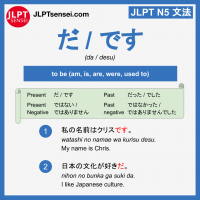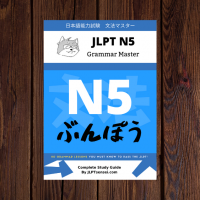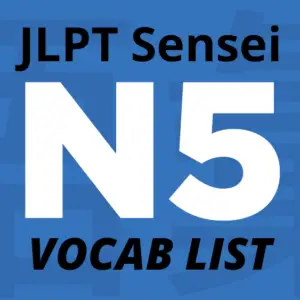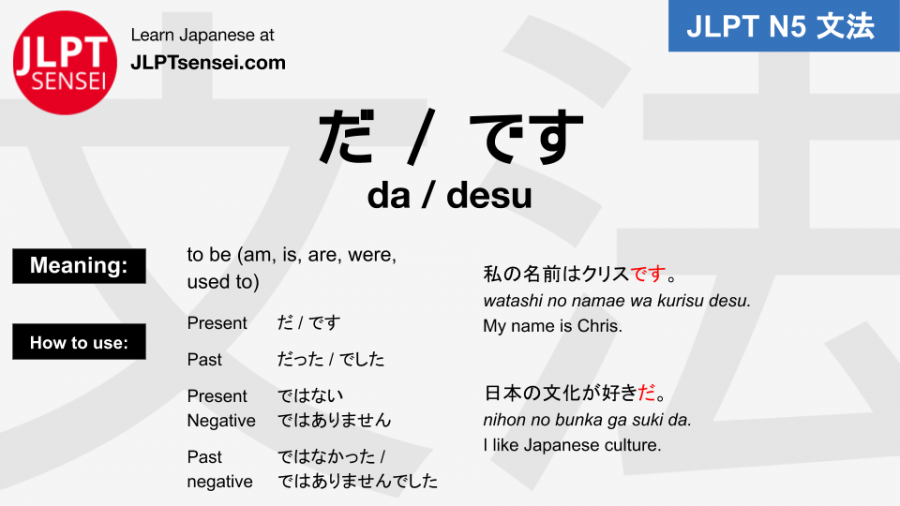Aprende gramática del idioma Japonés: だ (da) & です (desu). Significado: to be (am, is, are, were, used to).
Let’s look at some of the different ways this grammar can be used.
Present affirmative form – だ・です
Example A) です
私はクリスです。
watashi wa kurisu desu.
I am Chris.
This literally translates to «I Chris am». Remember that Japanese uses SOV (subject-object-verb), rather than SVO like English. This may be strange at first, but it will become natural after some practice.
Example B) だ
私はクリスだ。
watashi wa kurisu da.
I am Chris.
だ (da) and です (desu) have the exact same meaning, but です (desu) is more polite, so when in doubt it’s best to always use です (desu).
Example C) to be: am, is, are
私の名前はクリスです。
watashi no namae wa kurisu desu.
My name is Chris.
だ (da) and です (desu) can mean am, is and are. There is no distinction like in English, so it works for everything. This is one of the easier points of Japanese grammar.
Example D) They are
彼らは3年生です。
karera wa san nensei desu.
They are 3rd year students.
だった・でした (datta / deshita) – used to be (past)

When you want to say something «used to be» (was, were, used to, etc), you’ll want to use this conjugation. Once again, there is a casual form だった (datta), and the more polite でした (deshita).
Example E) Was
昨日はとてもきれいな日だった。
kinou wa totemo kireina hi datta.
Yesterday was a very beautiful day.
Example F) Used to
子どものとき、甘いものが好きでした。
kodomo no toki, amai mono ga suki deshita.
When I was a child, I used to like sweets.
Extra Study Notes
- To say the opposite, «to not be» (is/are not) instead, you can use じゃない・ではない (janai / dewa nai), or any of the negative conjugations listed in the «how to use» chart.

Click the image to download the flashcard.
Download all N5 grammar flashcards.

Download our complete
JLPT N5 Grammar Master E-book.
Access ALL extra downloads, ebooks, and study guides by supporting JLPT Sensei on Patreon.
だ・です - Oraciones de ejemplos 例文
Cada oración de ejemplo incluye ayudas como la lectura (hiragana) en Japónes, la lectura en romaji, y la traducción en Español.
Da clic en el siguiente botón rojo para alternar todas las ayudas, o puedes dar clic en los botones individuales para mostrar únicamente las que desees ver.
Ejemplo #1
今日は暑いだね。
Ejemplo #2
かれは私の友だちです。
Ejemplo #3
日本の文化が好きです。
Ejemplo #4
昔はサッカーが趣味だったが、今はやっていない。
Vocabulario 語彙
| Kanji 漢字 |
Kana カナ |
English 英語 |
|---|---|---|
| 私の | わたしの | my |
| 名前 | なまえ | name |
| 彼ら | かれら | they |
| 年生 | ねんせい | academic year |
| 昨日 | きのう | yesterday |
| とても | very | |
| 綺麗な | きれいな | beautiful |
| 日 | ひ | day |
| 子供 | こども | child |
| 時 | とき | time |
| 甘いもの | あまいもの | sweets |
| 好き | すき | to like |
| 日本の文化 | にほんのぶんか | Japanese culture |
| 今日 | きょう | today |
| 暑い | あつい | hot |
| 昔 | むかし | the past |
| 趣味 | しゅみ | hobby |
| 今 | いま | now |
| やっていない | not doing |
Ver todas las lecciones de gramática del JLPT N5



